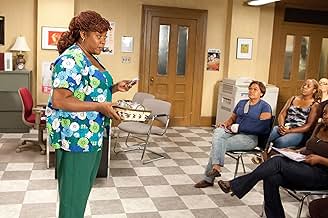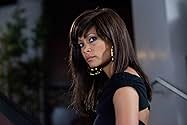Each of the women portray one of the characters represented in the collection of twenty poems, revealing different issues that impact women in general and women of color in particular.Each of the women portray one of the characters represented in the collection of twenty poems, revealing different issues that impact women in general and women of color in particular.Each of the women portray one of the characters represented in the collection of twenty poems, revealing different issues that impact women in general and women of color in particular.
- Awards
- 14 wins & 17 nominations total
- Tangie
- (as Thandie Newton)
- …
- Director
- Writers
- All cast & crew
- Production, box office & more at IMDbPro
Featured reviews
The cast was pretty strong over-all. Kimberly Elise, by far, led the pack with her amazing skill. Every time she graced the screen, the emotion and sorrow in her eyes pierced through my heart. She was absolutely PHENOMENAL and I expect her to be well recognized come award season. Thandie Newton was GORGEOUS as always, and did great, but seemed slightly overdone at times, especially when she tried to speak ebonics. (But that is expected, as she has a natural foreign accent.) I've noticed a lot of people criticize Kerry Washington's character as "overdone," but I really liked Kerry in this film and believed her completely. Anika Noni Rose, Tessa Thompson, and especially Phylicia Rashad also stood out to me, though they had some of the lesser roles. All three did wonderfully with what they were given. Janet Jackson...eh. I don't know what it is about her, but I have never been impressed with her acting. I don't know if she's not digging enough or if screen just isn't her forte, but she never feels believable to me and I feel uncomfortable watching her. I would definitely call her the weakness in the film.
A controversial topic regarding this movie is its "theme" (many label it a Sisters movie) and the message it portrays. A male friend of mine who was dragged along to see this movie with his cousin found it highly offensive to black men. I'm not going to lie---it certainly does label black men as "douches." All black men, with the exception of Kerry Washington's husband in the film, are portrayed as either emotionally, verbally, sexually, or physically abusive, selfish, and heartless---which as we all know is NOT true in real-life. There are plenty of great black men in this world that are educated, good providers, loving, respectful, honest, and that know how to treat women like princesses. I don't think was a man-bashing movie, but more-so a film that highlights many issues women experience that come hand-in-hand with broken families, absent fathers, violent men, rape/sexual abuse. I would recommend this to not just all black women, but to women of all races, as we ALL know someone---whether it be ourselves, our moms, our daughter, our sisters, our aunts, our cousins, our friends---who can relate to the struggles shown For Colored Girls.
That being said, I am very disappointed that one poster decided to comment not about the movie but about their own personal prejudices about black women, and probably black people in general. I'd like to point out, that NOT ONE woman in this film was on welfare. NOT ONE woman in this movie was living off "the tax payers" and NOT ONE woman in this film was living on easy street. If you just want to rant about your own personal prejudices then go to one of the political blogs. This is supposed to be an honest discussion about the movie.
An artful, gutsy, moving experience.
You could easily see this movie and say that it's overly artful, overtly gutsy, and an overwhelmingly moving experience. You would have to like this kind of high drama to get into this at all. Very high drama. I do, and so I loved this movie.
If you've seen "Crash" you know how this movie is put together--a series of high powered characters in tough situations are followed separately in an interwoven and increasingly connected urban universe. This is a work about women, African-American women, and about their ultimately horrible plight in a world of greed, horror, and men, who don't come off very well. So they turn increasingly inward, and to each other, to survive.
Director Tyler Perry has great material here--the Ntozake Shange play that wowed Broadway in 1975. One of the strengths here is one of the things people find irritating--the characters speak at times in long lines of poetic monologue. It isn't realistic, but it's beautiful, and in fact it really is poetry, and is part of the overall style. This helps form the overall aura of the movie, as well, of highbrow seriousness in a gutsy, often low income narrative. The story gets tweaked for 2010, though some of the themes don't make sense for our times, most glaring the backstreet abortion.
The acting is fabulous, and uniformly so. Everyone is able to really pour it on, which is difficult when they are sometimes speaking through actual poetry. And so through all the tears comes a realization that this very artificially outrageous drama has deeply deeply serious intentions.
If you like movies for how they are made--the editing, the filming, the set design--you'll be impressed. It's highly artful in a Hollywood, expensive way, an uncompromised production. Of course, as a viewer, you have to like that, especially when it gets artsy, as when a mother and daughter speak in two simultaneous monologues and the camera, and the sound, film back and forth between them, while still delicately keeping both threads continuous and palpable throughout. And the moment has huge symbolism, too, because it's about how they never understand each other, even when they pretend to try.
If there's a large problem here, it's in the endless excess. There is more tragedy, and more emotional crisis, than you can handle in a movie. I think it starts to be a parody of itself, and toward the end you are just ready for a catharsis. The choreographed ending is a little predictable and breezy, too, though even here, when the women gather on the roof, there is still a complex, interwove poetic power.
Forget the cynics and the impatient, if you can, that have slammed this film. It's not a typical Tyler Perry movie at all. It's a smart, beautiful film, and in some ways a great film.
The plat cannot be faithfully summarized, as it is a cluster of vignettes of ten women in crisis. Each character is given the name of a color of the rainbow, but they also have real names and the men in their off track lives actually do appear. It would be unfair to single out any one of these actresses as best because their roles are all different and make demands on the actresses in different ways. Whoopie Goldberg is the religiously inclined mother of Thandie Newton (a woman of physical needs that cannot be satisfied despite nightly change of partners) and Tessa Thompson (a high school girl with aspirations crushed by an unwanted pregnancy); Janet Jackson is a bitter, wealthy magazine editor married to the Down Low Omari Hardwick; Loretta Devine is a community service giver in a relationship with the undependable Richard Lawson; Kimberly Elise (breathtakingly magnificent!) is paired with the war-torn PTSD alcoholic and abusive Michael Ealy; Kerry Washington works for child services despite her infertility in her marriage to Hill Harper; Anika Noni Rose is a lovely innocent dance teacher brutally treated by Khalil Kain; Phylicia Rashad is the tenement house manager who is the central mother confessor to her tenants. How these women's lives are interconnected is fascinating as a story/screenplay: how these gifted actresses deliver the poetry of Shange is beyond anyone's expectations.
There are many issues this film deals with - single mother, violence against women, death, loss, partner abuse, etc - and each of the issues is poignant and keenly defined and acted. How this film slipped under the line for awards is anyone's guess. It is not to be missed.
Grady Harp
While most involved did a wonderful job, the standout performances came from Kimberly Elise, Phylicia Rashad, Loretta Devine, Michael Ealy and Anika Noni Rose. I thought Whoopi was too old for the character she played and Janet's characterization needed far more passion than she was able to present. The visit to the "death room" was out of place in the contemporary world Tyler Perry created.
But For Colored Girls was an experience. The movie made me thankful for my hard-working father who was always there, my brother-in-laws who treat my sisters well and for the many men I have been blessed to know who would not, could not rape, brutalize nor disrespect a woman. Hil Harper's character should have had some company. But then it would not have been Ntozoke Shange's story.
The performances make this movie worth your time.
Did you know
- TriviaThe first film directed by Tyler Perry to be rated R by the MPAA.
- GoofsWhen the "Lady in Green", Loretta Devine, does her solo of "Someone took my stuff" because her boyfriend walked out on her; she has on two different green earrings.
- Quotes
Yasmine: A rapist doesn't have to be a stranger to be legitimate. Someone you never saw. A man with obvious problems. But if you been public with him, danced one dance, kissed him goodbye lightly with a closed mouth, pressing charges will be as hard as keeping your legs closed while five fools try and run a train on you. These men friends of ours, who smile nicely, take you out to dinner, then lock the door behind you...
- ConnectionsFeatured in The Tonight Show with Jay Leno: Episode #19.26 (2010)
- SoundtracksWhat More Can They Do
Written and Performed by Laura Izibor
Published by Imagem (IMRO) and Universal Music Z Songs (BMI)
Courtesy of Atlantic Recording Corporation
Details
Box office
- Budget
- $21,000,000 (estimated)
- Gross US & Canada
- $37,729,698
- Opening weekend US & Canada
- $19,497,324
- Nov 7, 2010
- Gross worldwide
- $37,981,984
- Runtime2 hours 14 minutes
- Color
- Sound mix
- Aspect ratio
- 1.85 : 1
Contribute to this page






































